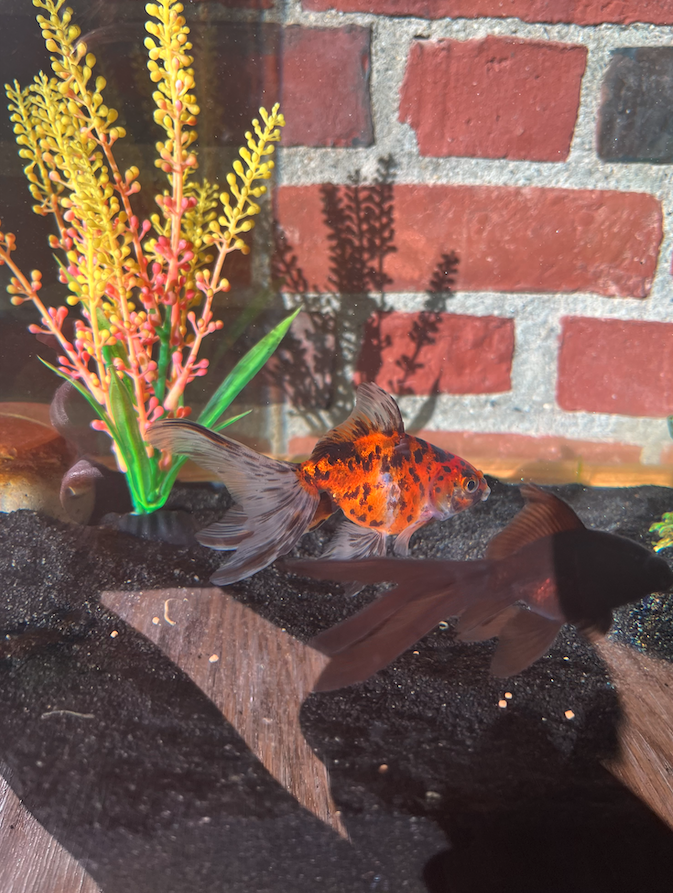
Learning how to cohabitate is a key feature of the collegiate experience. For some, that means living with a roommate with strange music taste or a confusing laundry routine. For others, that means living with a fish. This week, the Record interviewed five students who live with animals on campus — two dog co-owners, two cat owners, and a fish owner — to learn about the joy that these furry, or scaly, friends have brought them.
In order to live on campus, each pet, with the exception of the fish, needed to go through an approval process to become an Emotional Support Animal (ESA). As part of this process, their owners needed to write a personal statement explaining the medical necessity of bringing a pet to the College and answer a list of questions, get a letter from a healthcare provider to substantiate their medical condition, ensure their pet has received all required shots, and complete an interview with the Office of Accessible Education (OAE). Only then could their four-legged or two-finned creatures take up residence at the College.
Outside the ESA approval process, students can also work with OAE to register “service animals” — dogs that are individually trained to perform work or tasks for students with disabilities.
Pickles, an orange tabby cat and a resident of Sage 4, spends his days people-watching atop his cat tower, glaring at students milling in and out of Paresky. Clara Petitt ’27 and her family adopted Pickles in the parking lot of a Western Sizzlin’ Steakhouse in West Virginia, and she affectionately named him after her love of the preserved food. The tabby has kept her company during her adjustment to life at the College.
“Pickles and other ESAs emotionally regulate their owners,” Petitt told the Record in an interview. “It gives you a purpose to fall back on in times when you feel stressed… You have this other thing that you can look to for emotional connection and routine.”
When Petitt is busy finishing a problem set, Pickles entertains himself by playing with motion sensor toys and running through cat tunnels. She even has a mechanized system for taking care of him — his bowl automatically dispenses food at 7 a.m. and 7 p.m. every day, and his litter box cleans itself once a week.
Pickles has also helped Petitt find community on campus. “I’m pretty much known as ‘The person with the cat,’” she said. “I love being able to host people in my croom to get to know Pickles. It’s really great to connect and meet new people with him.”
Petitt has also connected with other ESA-owners. She belongs to a GroupMe of students with ESAs, in which they exchange animal pictures and offer advice on the best local veterinarians.
Six-month-old goldendoodle Rocky has become a campus celebrity over the last few months — making appearances at The Williams Octet rehearsals, Sage 2 entry snacks, and mornings at Goodrich Coffee Bar. Rocky’s owners, May Chen ’25 and Ford Koles ’25, met him last Valentine’s Day when they went on a date to a family-run breeder in the area and played with puppies. From the outset, they knew they had to bring him to the College and adopted him shortly thereafter. “He had the sweetest eyes, and we loved [him] immediately,” Chen wrote to the Record. “I put down a deposit that day and started the ESA process, then we brought Rocky home pretty soon after.”
For Chen, getting Rocky was not only a way of bringing joy into her life at the College — it was also a way of bringing structure to her day-to-day schedule. “I wanted the responsibility of looking out for Rocky and taking care of him, and that’s exactly what it’s been like,” she wrote. “I also just love dogs, and it’s weird to be at college without my dogs at home, so I wanted a little piece of that at Williams.”
According to Koles, Rocky, like any dog, requires a fair amount of maintenance, including frequent walks, ample play time outside, regular meals, potty training, and physical training to learn new tricks. “Socializing him has been easy because he is so nice and there are a lot of dog lovers living near us,” he wrote to the Record. “Most of it is fun, but it’s definitely a lot.”
Chen said that juggling school work, seeing friends, and owning a dog was difficult at first but has become easier with time and help from friends. “I can’t be away for long periods of time because he needs to be taken out, but all of my friends and Ford’s friends have been so supportive and helpful,” she wrote. “We definitely have a good group of people who are more than happy to play with him or look after him when we are away,” Koles added.
Despite these challenges, Chen and Koles emphasized that the joy Rocky has brought into their lives makes it all worth it. “I think that having Rocky has made my experience [at Williams] warmer,” Chen wrote. “I feel like I have a little home here, and my experience is less so solely academic.”
Unlike Rocky, Doritos Locos Taco (Dorito for short) and Joji do not need their owner, Ava Earthman ’24, to walk them every couple hours and play catch with them. Dorito and Joji are goldfish and have lived with Earthman at the College since 2022.

For Earthman — who does not visit her hometown Nome, Alaska, often during the academic year — having fish on campus has helped her feel more at home. “I grew up with a lot of pets, and they’ve always brought me a lot of joy, so I wanted some company at college,” she wrote in an email to the Record. “They’ve also helped me to feel more at home while staying in the dorms.”
While Earthman explained that goldfish do not require the same level of attention as cats and dogs, she noted that there are some challenges that come with owning fish on campus. “Every two weeks I need to do a water change [for their tank], which can be a hassle depending on the dorm I’m living in,” she wrote. “But the one I live in now has a custodian sink, which makes it a lot easier to dump and refill the water.”
Earthman said the biggest challenge she’s faced is finding a fish sitter when she leaves campus. “I’ve had to move the tank to different dorms over breaks sometimes when my friends happen to be out of town at the same time that I am,” she wrote.
None of these challenges, however, outweigh the comfort that Dorito and Joji have brought to Earthman’s life. “I definitely spend at least a few minutes every day just watching them swim around,” she wrote. “While they may not be as cuddly as a dog or cat, they do have very distinct personalities and have provided me with company when I’m otherwise just spending time alone in my dorm room.”
Kaleisha Towle ’24.5 said that her one-year-old cat Sylvia has been an important support system for her this year. After receiving a medical diagnosis last summer, Towle decided to adopt Sylvia as an ESA. “I was struggling to process my diagnosis, and I started to remember that, when I was a kid and I was feeling down, my dog would make me feel so much better,” she said. “I wanted to look into the possibility of having that again, which is why I got Sylvia.”
Towle said that she has had to adjust aspects of her student life, like her sleep schedule, since getting Sylvia. “Cats are semi-nocturnal, so I wake up with her at 4:30 a.m. every morning,” she said. “This definitely makes it harder to stay up late doing work.”
Having a cat in a small living space has also been a challenge for Towle at times. “I have to put extra effort into making sure [Sylvia] gets exercise, because she doesn’t exactly have a whole house to roam around in,” she said. “We end up playing a lot of games together.”
According to Towle, the emotional support Sylvia provides her each day is invaluable. “She’s always so happy to see me when I come home, which never fails to lift me up when I’m feeling down,” she said.
Towle encourages anyone who could imagine thriving in the company of a pet to go for it. “It’s not for everyone, but if you think you could benefit from a pet and they could benefit from you, I would absolutely recommend it,” she said.
Earthman echoed this sentiment while emphasizing the importance of students examining their own limits before getting a pet on campus. “It really depends on the type of person you are and the individual level of comfort you feel you would gain from having the company of a pet,” she wrote. “But in my experience, the joy of having pets has outweighed the hassle.”








